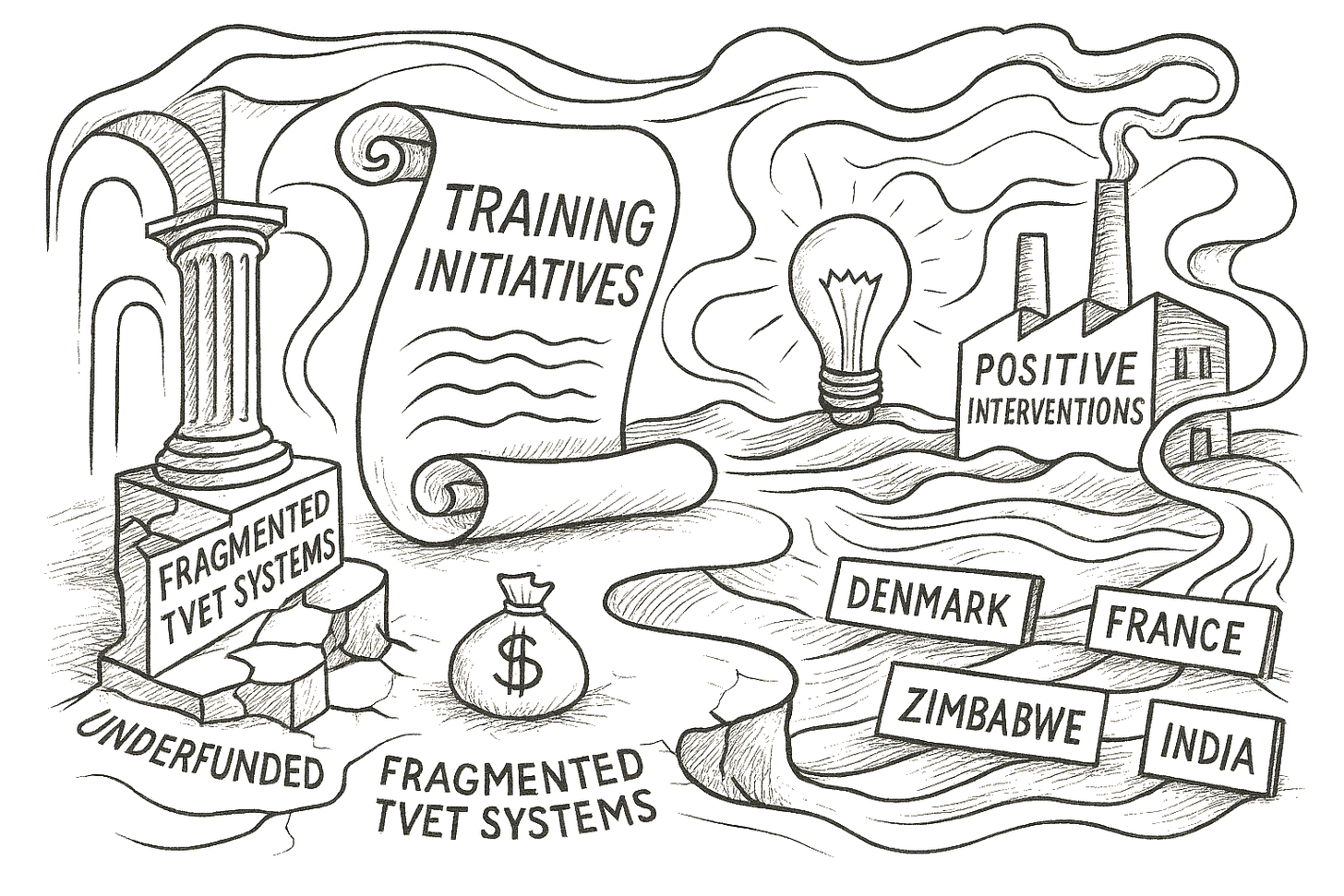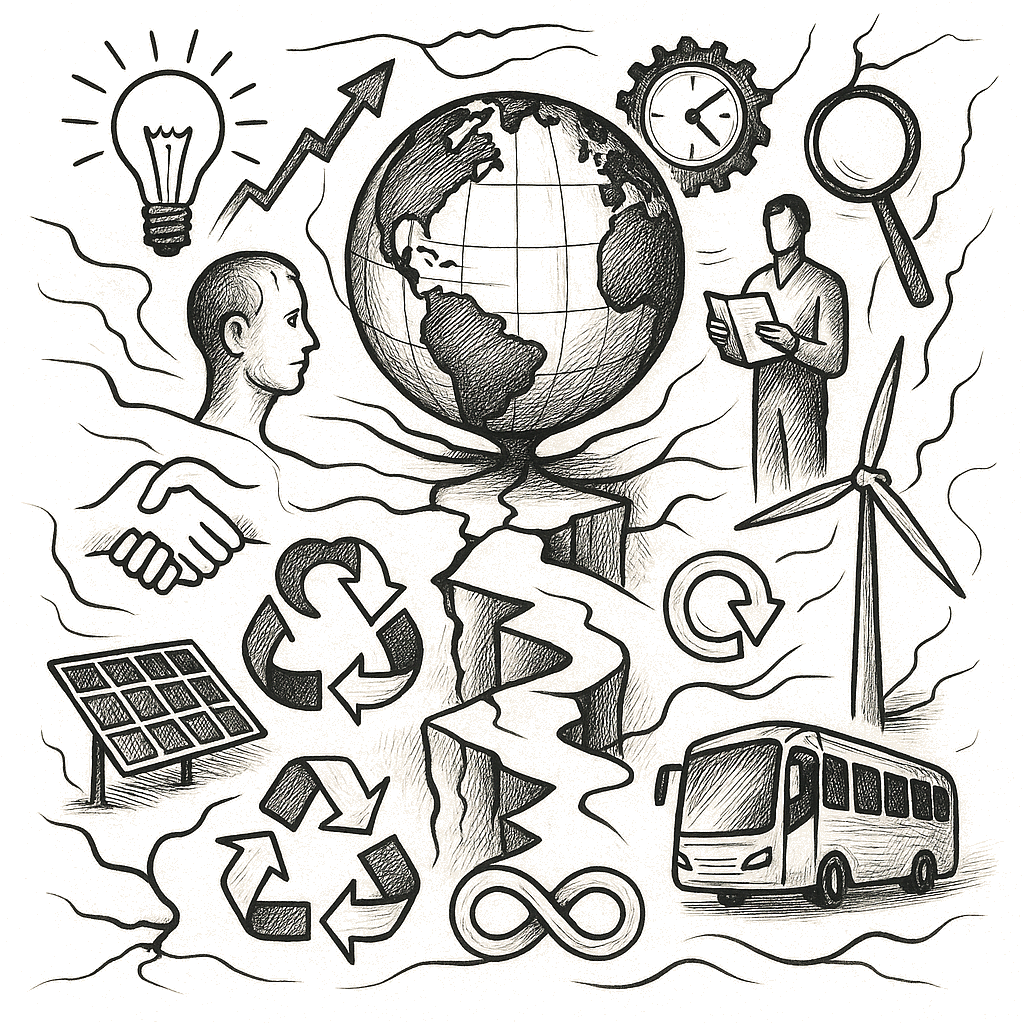About (not) falling through the cracks
The Green Edge's Top Read for August is not simply diagnostic, it is prescriptive and forward-looking.
An alternative audio version of this post is also available here (paid subscribers only).
There’s a certain relief in encountering writing that doesn’t just rehearse the same old arguments about skills, jobs, and climate policy, but instead sees the bigger picture and shows its cracks. Our Top Read this month is one such piece: Hae Kyeung Chun’s essay Falling Through the Cracks? Skilling, Reskilling and Upskilling for Job Transitions, a chapter in Rethinking Economic Transformation for Sustainable and Inclusive Development (Elgar, 2024). It is both global in scope and direct in its implications.
The numbers alone are jolting. Chun builds on ILO and OECD modelling which projects that the net zero transition could create 103 million jobs globally by 2030, while simultaneously destroying 78 million. That arithmetic leaves a gap—24 million people whose jobs will vanish without clear pathways to re-employment. The essay argues persuasively that unless countries invest deliberately in reskilling and lifelong learning systems, those workers will simply “fall through the cracks.”
Plenty of reports talk about skills in the abstract; Chun’s essay does three things that set it apart.
First, it connects climate goals directly to skills. Net zero is not just about technology deployment or climate finance; it’s about people—the engineers who retrofit homes, the technicians who maintain wind farms, the care workers whose jobs free up others to transition. The argument is clear: climate ambition without workforce readiness is an empty promise.
Second, it identifies urgent skills gaps with specificity. Renewable energy, energy efficiency, and low-carbon transport emerge as the sectors where shortages will be most acute. The essay avoids generalities and points to where action is needed—whether that means upskilling existing workers, attracting new entrants, or creating career pathways for women and underrepresented groups.
Third, it frames the entire issue in just transition terms. For Chun, skilling is not simply about economic growth; it is about fairness. Without targeted policies, the benefits of the green economy will be uneven, deepening existing inequalities. Coal miners in South Africa, informal workers in India, older industrial workers in France, and women in technical fields across the globe all face the risk of exclusion unless reskilling systems are inclusive by design.
One of the strengths of the essay is its reliance on evidence and case studies. It does not merely speculate but reviews where reskilling efforts have worked—and where they have failed. The lessons are depressingly familiar: training programmes underfunded, technical and vocational education and training (TVET) systems fragmented, and labour market intelligence too weak to anticipate emerging needs.
At the same time, the case studies highlight positive interventions. In Denmark, strong national coordination bodies have successfully linked industrial strategy to skills planning. In France, union-led retraining programmes have softened the blow of industrial restructuring. Zimbabwe and India provide examples of how sectoral and community-based initiatives can open pathways for vulnerable groups. These stories underscore the essay’s central point: policies matter. With coherence, financing, and social dialogue, reskilling can work. Without them, the cracks widen.
We flagged ten reasons why this essay should be considered essential reading for anyone concerned with the future of jobs and net zero. In short: this chapter is not simply diagnostic, it is prescriptive and forward-looking:
Direct link between climate goals and skills – it makes clear that achieving net zero depends not just on technology and policy, but on equipping workers and business leaders with the right skills and mindsets.
Identifies urgent skills gaps – it highlights where the largest shortages exist (e.g., renewable energy, energy efficiency, low-carbon transport), helping readers understand priority areas.
Focus on vulnerable workers – it stresses that without targeted reskilling and upskilling, many workers in carbon-intensive industries risk being left behind and this has a distinct spatial pattern.
Emphasis on just transition – it frames skill development as essential to ensuring fairness and inclusivity, avoiding further/worsening social and economic inequalities.
Evidence-based insights – the text draws on case studies and labour market data to show how reskilling has worked (or failed) in real-world transitions.
Global and local perspective – it discusses how the skills transition differs across countries and sectors, giving a well-rounded view.
Concrete policy recommendations – it provides actionable strategies for governments, employers, and education systems to align skills with the net zero (and circular) economy.
Integration of lifelong learning – it argues convincingly for continuous learning systems to support workers throughout their careers, not just at entry points.
Spotlight on systemic barriers – the text uncovers why existing training systems often fail to meet green economy needs, such as funding gaps, mismatched curricula, and lack of coordination.
Forward-looking analysis – it doesn’t just diagnose problems but also envisions how future skills ecosystems must evolve to drive both economic growth and climate resilience.
And, for readers who want the elevator pitch, we can distil the essay down to five key takeaways:
Skills are the backbone of the green transition – Net zero targets can only be met if workers are equipped with both technical and soft skills to adapt to rapidly evolving industries.
Job creation outweighs job loss, but mismatches loom – Millions of new green jobs will emerge, yet many workers from high-carbon sectors will need substantial reskilling to avoid unemployment.
Training systems are lagging – Current TVET (technical and vocational education and training) and lifelong learning systems are underfunded, fragmented, and not sufficiently aligned with green economy demands.
Equity and inclusion are non-negotiable – Vulnerable groups (women, youth, informal workers, older workers) face systemic barriers; without tailored interventions, they risk being excluded from opportunities.
Policy coherence and financing are critical – Governments, employers, and unions must coordinate strategies, invest in lifelong learning, and innovate in financing mechanisms to ensure a just and inclusive transition.
This month’s wider reading list included over 70 publications, many of which had sharp sectoral or regional focus. We reviewed studies on everything from Germany’s energy transition to Scotland’s Prosper Blueprint, from corporate carbon market guides to far-infrared heating innovation. Each added a piece to the puzzle of how economies and societies are adjusting—or failing to adjust—to the demands of climate and digital transitions.
Among them were two strong contenders for Top Read status that ultimately became our runners-up:
The Water Industry Labour Report (May 2025). This survey of 4,391 engineers paints a worrying picture of shortages in the UK water sector. Nearly half of respondents cited skills shortages as the top issue, up from 26% the year before. Two-thirds of engineers plan to leave the sector, either through retirement or moving into renewables and nuclear. With AMP8’s £104 billion investment programme now underway, these shortages could derail delivery. The report warns of an “NHS-like” workforce crisis unless urgent action is taken.
RenewableUK’s Wind Energy Supply Chain Map (June 2025). This mapping exercise identifies nearly 2,000 companies involved in the UK’s offshore wind industry, highlighting industrial clusters in London, Edinburgh, Aberdeen, Lowestoft and Great Yarmouth. The map provides policymakers and investors with a tool to strengthen supply chains, develop workforce hubs, and boost export competitiveness.
Both of these reports are valuable and well executed. They provide critical insights into two very different sectors—one high-profile and politically visible (wind), the other largely invisible but no less essential (water). Together, they underline a key point: skills gaps are not confined to any one industry.
So why did Chun’s essay take the Top Read slot over these strong contenders? The answer is breadth and systemic perspective. The water and wind reports are sectoral snapshots—vital, but siloed. Falling Through the Cracks situates those kinds of issues in a global frame. It forces us to see that the question is not simply whether we can train enough engineers for wind or retain enough specialists in water. The deeper challenge is whether our entire skills ecosystem—globally—can keep pace with the scale of transformation required.
And that is the crack most at risk of widening. Without sustained, coordinated action, we will not only fail to equip the workers who build wind farms and maintain water systems; we will also exclude millions from the green economy altogether.







